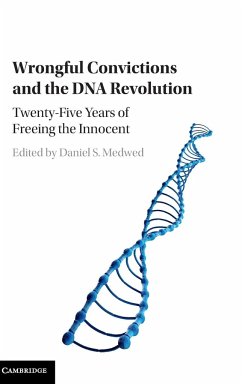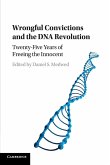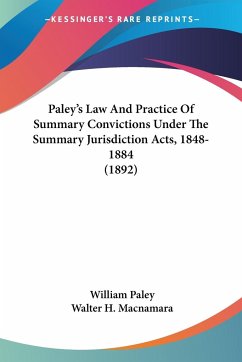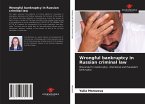Wrongful Convictions and the DNA Revolution
Herausgeber: Medwed, Daniel S.
Wrongful Convictions and the DNA Revolution
Herausgeber: Medwed, Daniel S.
- Gebundenes Buch
- Merkliste
- Auf die Merkliste
- Bewerten Bewerten
- Teilen
- Produkt teilen
- Produkterinnerung
- Produkterinnerung
For centuries, most people believed the criminal justice system worked - that only guilty defendants were convicted. DNA technology shattered that belief. DNA has now freed more than three hundred innocent prisoners in the United States. This book examines the lessons learned from twenty-five years of DNA exonerations and identifies lingering challenges.
Andere Kunden interessierten sich auch für
![Wrongful Convictions and the DNA Revolution Wrongful Convictions and the DNA Revolution]() Wrongful Convictions and the DNA Revolution45,99 €
Wrongful Convictions and the DNA Revolution45,99 €![Wrongful Convictions Wrongful Convictions]() Justin BrooksWrongful Convictions105,99 €
Justin BrooksWrongful Convictions105,99 €![Wrongful Convictions in China Wrongful Convictions in China]() Na JiangWrongful Convictions in China116,99 €
Na JiangWrongful Convictions in China116,99 €![Paley's Law And Practice Of Summary Convictions Under The Summary Jurisdiction Acts, 1848-1884 (1892) Paley's Law And Practice Of Summary Convictions Under The Summary Jurisdiction Acts, 1848-1884 (1892)]() William PaleyPaley's Law And Practice Of Summary Convictions Under The Summary Jurisdiction Acts, 1848-1884 (1892)52,99 €
William PaleyPaley's Law And Practice Of Summary Convictions Under The Summary Jurisdiction Acts, 1848-1884 (1892)52,99 €![Flawed Convictions Flawed Convictions]() Deborah TuerkheimerFlawed Convictions29,99 €
Deborah TuerkheimerFlawed Convictions29,99 €![The Victimology of a Wrongful Conviction The Victimology of a Wrongful Conviction]() Nicky Ali JacksonThe Victimology of a Wrongful Conviction197,99 €
Nicky Ali JacksonThe Victimology of a Wrongful Conviction197,99 €![Wrongful bankruptcy in Russian criminal law Wrongful bankruptcy in Russian criminal law]() Yulia MorozovaWrongful bankruptcy in Russian criminal law46,99 €
Yulia MorozovaWrongful bankruptcy in Russian criminal law46,99 €-
-
-
For centuries, most people believed the criminal justice system worked - that only guilty defendants were convicted. DNA technology shattered that belief. DNA has now freed more than three hundred innocent prisoners in the United States. This book examines the lessons learned from twenty-five years of DNA exonerations and identifies lingering challenges.
Hinweis: Dieser Artikel kann nur an eine deutsche Lieferadresse ausgeliefert werden.
Hinweis: Dieser Artikel kann nur an eine deutsche Lieferadresse ausgeliefert werden.
Produktdetails
- Produktdetails
- Verlag: Cambridge University Press
- Seitenzahl: 440
- Erscheinungstermin: 3. März 2017
- Englisch
- Abmessung: 235mm x 157mm x 30mm
- Gewicht: 861g
- ISBN-13: 9781107129962
- ISBN-10: 1107129966
- Artikelnr.: 47151715
- Herstellerkennzeichnung
- Libri GmbH
- Europaallee 1
- 36244 Bad Hersfeld
- gpsr@libri.de
- Verlag: Cambridge University Press
- Seitenzahl: 440
- Erscheinungstermin: 3. März 2017
- Englisch
- Abmessung: 235mm x 157mm x 30mm
- Gewicht: 861g
- ISBN-13: 9781107129962
- ISBN-10: 1107129966
- Artikelnr.: 47151715
- Herstellerkennzeichnung
- Libri GmbH
- Europaallee 1
- 36244 Bad Hersfeld
- gpsr@libri.de
Foreword Barry Scheck and Peter Neufeld; Introduction. Talking about a
revolution: a quarter century of DNA exonerations Daniel S. Medwed;
Innocence before DNA Michael Meltsner; Part I. A Look Back - What Have We
Learned from 25 Years of DNA Exonerations?; Section 1. The Big Picture: 1.
Convicting the innocent redux Brandon L. Garrett; 2. Has the innocence
movement become an exoneration movement? The risks and rewards of
redefining innocence Richard A. Leo; Section 2. A Closer Look at Specific
Lessons: 3. Negotiating accuracy - DNA in the age of plea bargaining
Alexandra Natapoff; 4. Reacting to recantations Rob Warden; 5. A tale of
two innocence clinics - client representation and legislative advocacy
Jacqueline McMurtrie; Section 3. The DNA Era and Changing Views of the
Death Penalty: 6. How DNA has changed contemporary death penalty debates
Michael L. Radelet; 7. What does innocence have to do with cruel and
unusual punishment? Robert J. Smith, G. Ben Cohen and Zoe Robinson; Part
II. A Glance Ahead - What Can Be Done to Avoid Wrongful Convictions in the
Future?; Section 4. Substantive Reforms: 8. Flawed science and the new wave
of innocents Keith A. Findley; 9. Prosecutors - the thin last line
protecting the innocent George C. Thomas, III; 10. Ineffective assistance
of counsel and the innocence revolution - a standards-based approach Adele
Bernhard; Section 5. Procedural Changes: 11. Post-conviction procedure -
the next frontier in innocence reform Stephanie Roberts Hartung; 12. Can we
protect the innocent without freeing the guilty? Thoughts on innocence
reforms that avoid harmful tradeoffs Paul G. Cassell; 13. Retrospective
justice in the age of innocence - the hard case of rape executions Margaret
Burnham; 14. Outbreaks of injustice - responding to systemic irregularities
in the criminal justice system Sandra Guerra Thompson and Robert Wicoff;
15. Exonerating the innocent - habeas for nonhuman animals Justin F.
Marceau and Steven Wise; Section 6. The International Arena: 16. The global
innocence movement Mark Godsey; 17. Innocence at war Erik Luna.
revolution: a quarter century of DNA exonerations Daniel S. Medwed;
Innocence before DNA Michael Meltsner; Part I. A Look Back - What Have We
Learned from 25 Years of DNA Exonerations?; Section 1. The Big Picture: 1.
Convicting the innocent redux Brandon L. Garrett; 2. Has the innocence
movement become an exoneration movement? The risks and rewards of
redefining innocence Richard A. Leo; Section 2. A Closer Look at Specific
Lessons: 3. Negotiating accuracy - DNA in the age of plea bargaining
Alexandra Natapoff; 4. Reacting to recantations Rob Warden; 5. A tale of
two innocence clinics - client representation and legislative advocacy
Jacqueline McMurtrie; Section 3. The DNA Era and Changing Views of the
Death Penalty: 6. How DNA has changed contemporary death penalty debates
Michael L. Radelet; 7. What does innocence have to do with cruel and
unusual punishment? Robert J. Smith, G. Ben Cohen and Zoe Robinson; Part
II. A Glance Ahead - What Can Be Done to Avoid Wrongful Convictions in the
Future?; Section 4. Substantive Reforms: 8. Flawed science and the new wave
of innocents Keith A. Findley; 9. Prosecutors - the thin last line
protecting the innocent George C. Thomas, III; 10. Ineffective assistance
of counsel and the innocence revolution - a standards-based approach Adele
Bernhard; Section 5. Procedural Changes: 11. Post-conviction procedure -
the next frontier in innocence reform Stephanie Roberts Hartung; 12. Can we
protect the innocent without freeing the guilty? Thoughts on innocence
reforms that avoid harmful tradeoffs Paul G. Cassell; 13. Retrospective
justice in the age of innocence - the hard case of rape executions Margaret
Burnham; 14. Outbreaks of injustice - responding to systemic irregularities
in the criminal justice system Sandra Guerra Thompson and Robert Wicoff;
15. Exonerating the innocent - habeas for nonhuman animals Justin F.
Marceau and Steven Wise; Section 6. The International Arena: 16. The global
innocence movement Mark Godsey; 17. Innocence at war Erik Luna.
Foreword Barry Scheck and Peter Neufeld; Introduction. Talking about a
revolution: a quarter century of DNA exonerations Daniel S. Medwed;
Innocence before DNA Michael Meltsner; Part I. A Look Back - What Have We
Learned from 25 Years of DNA Exonerations?; Section 1. The Big Picture: 1.
Convicting the innocent redux Brandon L. Garrett; 2. Has the innocence
movement become an exoneration movement? The risks and rewards of
redefining innocence Richard A. Leo; Section 2. A Closer Look at Specific
Lessons: 3. Negotiating accuracy - DNA in the age of plea bargaining
Alexandra Natapoff; 4. Reacting to recantations Rob Warden; 5. A tale of
two innocence clinics - client representation and legislative advocacy
Jacqueline McMurtrie; Section 3. The DNA Era and Changing Views of the
Death Penalty: 6. How DNA has changed contemporary death penalty debates
Michael L. Radelet; 7. What does innocence have to do with cruel and
unusual punishment? Robert J. Smith, G. Ben Cohen and Zoe Robinson; Part
II. A Glance Ahead - What Can Be Done to Avoid Wrongful Convictions in the
Future?; Section 4. Substantive Reforms: 8. Flawed science and the new wave
of innocents Keith A. Findley; 9. Prosecutors - the thin last line
protecting the innocent George C. Thomas, III; 10. Ineffective assistance
of counsel and the innocence revolution - a standards-based approach Adele
Bernhard; Section 5. Procedural Changes: 11. Post-conviction procedure -
the next frontier in innocence reform Stephanie Roberts Hartung; 12. Can we
protect the innocent without freeing the guilty? Thoughts on innocence
reforms that avoid harmful tradeoffs Paul G. Cassell; 13. Retrospective
justice in the age of innocence - the hard case of rape executions Margaret
Burnham; 14. Outbreaks of injustice - responding to systemic irregularities
in the criminal justice system Sandra Guerra Thompson and Robert Wicoff;
15. Exonerating the innocent - habeas for nonhuman animals Justin F.
Marceau and Steven Wise; Section 6. The International Arena: 16. The global
innocence movement Mark Godsey; 17. Innocence at war Erik Luna.
revolution: a quarter century of DNA exonerations Daniel S. Medwed;
Innocence before DNA Michael Meltsner; Part I. A Look Back - What Have We
Learned from 25 Years of DNA Exonerations?; Section 1. The Big Picture: 1.
Convicting the innocent redux Brandon L. Garrett; 2. Has the innocence
movement become an exoneration movement? The risks and rewards of
redefining innocence Richard A. Leo; Section 2. A Closer Look at Specific
Lessons: 3. Negotiating accuracy - DNA in the age of plea bargaining
Alexandra Natapoff; 4. Reacting to recantations Rob Warden; 5. A tale of
two innocence clinics - client representation and legislative advocacy
Jacqueline McMurtrie; Section 3. The DNA Era and Changing Views of the
Death Penalty: 6. How DNA has changed contemporary death penalty debates
Michael L. Radelet; 7. What does innocence have to do with cruel and
unusual punishment? Robert J. Smith, G. Ben Cohen and Zoe Robinson; Part
II. A Glance Ahead - What Can Be Done to Avoid Wrongful Convictions in the
Future?; Section 4. Substantive Reforms: 8. Flawed science and the new wave
of innocents Keith A. Findley; 9. Prosecutors - the thin last line
protecting the innocent George C. Thomas, III; 10. Ineffective assistance
of counsel and the innocence revolution - a standards-based approach Adele
Bernhard; Section 5. Procedural Changes: 11. Post-conviction procedure -
the next frontier in innocence reform Stephanie Roberts Hartung; 12. Can we
protect the innocent without freeing the guilty? Thoughts on innocence
reforms that avoid harmful tradeoffs Paul G. Cassell; 13. Retrospective
justice in the age of innocence - the hard case of rape executions Margaret
Burnham; 14. Outbreaks of injustice - responding to systemic irregularities
in the criminal justice system Sandra Guerra Thompson and Robert Wicoff;
15. Exonerating the innocent - habeas for nonhuman animals Justin F.
Marceau and Steven Wise; Section 6. The International Arena: 16. The global
innocence movement Mark Godsey; 17. Innocence at war Erik Luna.








